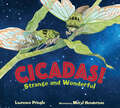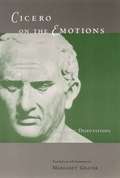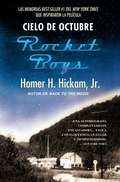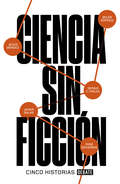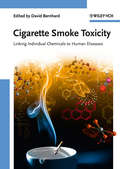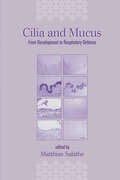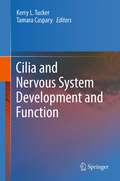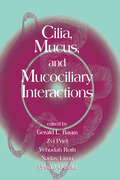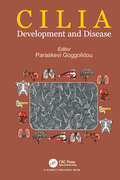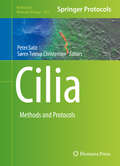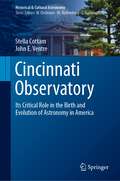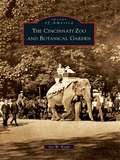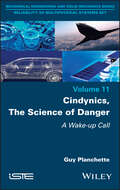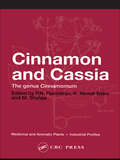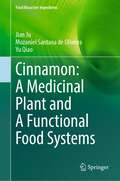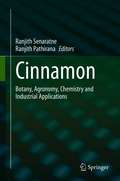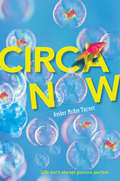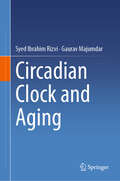- Table View
- List View
Cicadas!: Strange and Wonderful (Strange and Wonderful)
by Laurence Pringle"Definitely the best cicada book for kids. Adults will appreciate it as well, as it is well written, factually accurate, and beautifully illustrated." —Cicadamania.com Discover why cicadas are all the buzz in the most complete, comprehensive book for kids about these noisy but harmless insects.Every year, annual cicadas emerge and pierce the air with their buzzing calls. Also every year, at least one brood of 13 or 17 year cicadas emerges in some part of the eastern or central United States. In Spring 2021, a group of 17 year periodical cicadas called Brood X will make their appearance in the Mid-Atlantic region of the United States. Author Laurence Pringle and illustrator Meryl Henderson have created the story of this fascinating and often misunderstood insect, one that deserves to be protected.
Cicero on the Emotions: Tusculan Disputations 3 and 4
by Marcus TulliusThe third and fourth books of Cicero's Tusculan Disputations deal with the nature and management of human emotion: first grief, then the emotions in general. In lively and accessible style, Cicero presents the insights of Greek philosophers on the subject, reporting the views of Epicureans and Peripatetics and giving a detailed account of the Stoic position, which he himself favors for its close reasoning and moral earnestness. Both the specialist and the general reader will be fascinated by the Stoics' analysis of the causes of grief, their classification of emotions by genus and species, their lists of oddly named character flaws, and by the philosophical debate that develops over the utility of anger in politics and war. Margaret Graver's elegant and idiomatic translation makes Cicero's work accessible not just to classicists but to anyone interested in ancient philosophy and psychotherapy or in the philosophy of emotion. The accompanying commentary explains the philosophical concepts discussed in the text and supplies many helpful parallels from Greek sources.
Ciclos del tiempo: Una extraordinaria nueva visión del universo
by Roger PenroseUna extraordinaria nueva visión del universo. La revolucionaria y exitosa obra de Roger Penrose El camino a la realidad presentaba una guía completa y comprensible de las leyes que rigen el universo desde nuestro conocimiento actual. En Ciclos del tiempo, su libro más ambicioso, Penrose va mucho más allá: desarrolla una visión inédita de la cosmología y propone una respuesta inesperada a la pregunta "¿Qué pasó antes del Big Bang?". Las dos ideas clave que hay detrás de esta nueva visión son un penetrante análisis de la Segunda Ley de la termodinámica (que establece el principio de la entropía) y el estudio de la geometría de conos de luz del espacio-tiempo. Penrose logra combinar estos dos temas para demostrar que el destino último de nuestro universo en expansión y aceleración puede ser visto como el "big bang" de uno nuevo. Por el camino, nos explica muchos otros ingredientes básicos de esta idea y comenta varios modelos cosmológicos, tanto ortodoxos como heterodoxos, así como el papel fundamental y ubicuo de la radiación cósmica de microondas. Otra parte crucial de su exposición es la relativa a los inmensos agujeros negros detectados en los centros de las galaxias, y su eventual desaparición a través del misterioso proceso de evaporación de Hawking. Una obra fundamental para todos los amantes de la ciencia Reseñas:«El camino a la realidad es una innovación radical en la divulgación científica. En primer lugar porque desafía de manera flagrante y sistemática la ley de Hawking: "Cada ecuación que introduces en un libro reduce las ventas a la mitad"... El camino a la realidad es, simple y llanamente, una invitación a todo el mundo que quiera subirse al carro de la ciencia contemporánea.»Javier Sampedro, Babelia «El optimismo de Penrose es contagioso. Lo cierto es que a quien se atreve con este libro se le exige un enorme esfuerzo que tiene una incomparable recompensa: lo que aquí se cuenta es la aproximación más perfecta que se tiene de la realidad. El aparato construido para llevar a cabo esta proeza es uno de los productos más sublimes que puede aportar la mente humana como tarjeta de visita... la satisfacción intelectual está garantizada.»Leer «Aquellos interesados en los secretos del universo y su inquietante pasado, presente y futuro no pueden perderse este fascinante relato del gran divulgador de la astrofísica contemporánea.»La Razón
Cielo de octubre (Rocket Boys)
by Homer HickamAsí comienza la maravillosamente entretenida y extraordinaria autobiografía de la vida de «Sonny» Homer Hickam, Jr. en Coalwood, Virginia Occidental, un pueblo miserable donde lo único que importaba era la minería de carbón y el fútbol americano. El segundo hijo introspectivo del superintendente de la mina y de una madre decidida a alcanzar una vida mejor para su hijo, Sonny se unió a un grupo de inadaptados para quienes el futuro parecía incierto. Pero en 1957, luego de haber visto el satélite soviético Sputnik cruzar el cielo de los Apalaches, Sonny y sus amigos adolescentes tomaron el futuro en sus manos, cambiando sus vidas y su ciudad para siempre.Recordando una carrera distinguida en la NASA que hizo realidad los sueños de su niñez, Hickam relata la historia de su juventud, llevando a los lectores a la vida de aquel pueblo minero y las de los muchachos que encarnaron sus tensiones y sus sueños. Con la ayuda —y en ocasiones los obstáculos— de los habitantes de Coalwood, los jóvenes aprendieron no solo a convertir escombros de minería en cohetes que surcaban los cielos, sino que encontraron esperanza en una ciudad en la que el progreso pasaba desapercibido.Una autobiografía única, Cielo de octubre es a la vez una crónica inspiradora de triunfo y una historia luminosa del amor de una madre, los temores de un padre y la vida de un joven.Con la sencilla gracia de un narrador por naturaleza, Homer Hickam capta a la perfección un momento en el cual un pueblo agonizante, una familia dividida y una banda de adolescents soñadores se atrevieron a mirar más allá de sus diferencias y a fijar sus objetivos en las estrellas... y vieron un futuro que la nación estaba apenas empezando a imaginar.
Ciencia sin ficción: Cinco historias
by Jesús MéndezUn compendio indispensable que nos acerca a la cara más humana de la ciencia. Ciencia sin ficción es un título, un concepto y una declaración de intenciones que parte de dos ideas complementarias: por un lado, se basa en la convicción de que la ciencia es un terreno fértil y poco explorado donde aprovechar lo que el Nuevo Periodismo llamó en su día literatura de no ficción; por otro, se asienta en la creencia de que son muy pocos los relatos o novelas que consideran la ciencia como paisaje o motor, más allá de los encuadrados dentro de una imaginaria, distópica o alternativa ciencia ficción. Con estas premisas en mente, esta obra recoge cinco historias esencialmente narrativas: los orígenes y las implicaciones de la tecnología CRISPR para la revolución genética; una conversación con Pedro Duque sobre su primer viaje espacial; un alegato personal y general contra las irracionalidades de las pseudociencias; un viaje desde los orígenes de la física cuántica hasta Instagram, y una conversación de ficción sobre la inteligencia artificial más actual y sus algoritmos y consecuencias. Las firman el médico, científico y periodista Jesús Méndez; el bioquímico y periodista Pere Estupinyà; el periodista Javier Salas; el astrofísico, poeta y periodista Sergio C. Fanjul, y la escritora Belén Gopegui. Ciencia sin ficción se propone agrupar caminos para, con ello, reforzarlos. Pretende ser, más allá de una declaración de intenciones, un impulso, una etiqueta de reunión.
Ciencia, anticiencia y sus alrededores: Ensayos para alimentar la curiosidad
by Fedro Carlos GuillénEl conocimiento científico no es un tesoro reservado a personas con inteligencias superiores, sino algo a lo que cualquiera con sentido común puede acceder. Para demostrarlo, aquí se reunen algunas de las inquietudes de Fedro Carlos Guillén, científico y escritor, cuya intención es compartir su curiosidad con los lectores de una manera fresca y personal. Cada artículo es abordado con un estilo jovial y a veces irónico. Al tiempo que nos informa sobre los avances y algunas ideas curiosas de los procesos científicos, toma la palabra para pronunciarse sobre temas polémicos, invitando al lector a formar su propia opinión. Los hechos y posibilidades de la genética, los retos de la inteligencia artificial, la urgencia del cambio climático, el problema de las seudociencias, el éxito de los suicidas, la biología del amor y el sexo entre quienes dicen practicar el celibato, así como los aciertos y desaciertos de la propia ciencia, son algunos de ellos.
Ciencias (Edicion para Texas)
by Timothy Cooney Karen L. Ostlund Michael Anthony Dispezio Barbara K. Foots Kate Boehm Nyquist Angie L. MatamorosA Science Textbook in Spanish
Ciencias (Edicion para Texas, Grade 4)
by Timothy Cooney Karen L. Ostlund Michael Anthony Dispezio Barbara K. Foots Kate Boehm Nyquist Angie L. MatamorosSpanish Science Textbook.
Ciencias y Technologia (Grado #6)
by Holt Rinehart Winston StaffSpanish textbook on science and technology.
Cigarette Smoke Toxicity: Linking Individual Chemicals to Human Diseases
by David BernhardSmoking causes and contributes to a large number of human diseases, yet due to the large number of potentially hazardous compounds in cigarette smoke -- almost 5,000 chemicals have been identified, establishing the link between smoking and disease has often proved difficult. This unbiased and scientifically accurate overview of current knowledge begins with an overview of the chemical constituents in cigarette smoke, their fate in the human body, and their documented toxic effects on various cells and tissues. Recent results detailing the many ways components of cigarette smoke adversely affect human health are also presented, highlighting the role of smoking in cardiovascular, respiratory, infectious and other diseases. A final chapter discusses current strategies for the treatment and prevention of smoking-induced illness. Despite the obvious importance of the topic, this is the first comprehensive reference on tobacco smoke toxicity, making for essential reading for all toxicologists and healthcare professionals dealing with smoking-related diseases.
Cilia and Mucus: From Development to Respiratory Defense
by Matthias SalatheThis book details advances in research regarding cilia, mucus, and mucociliary clearance, examining changes in mucus expression and goblet cell metaplasia, and assessing the ability of the mucociliary system to respond to abnormalities. Recognizes that cilia and dynein arms play pivotal roles in developing mammalian embryos!Examines the rol
Cilia and Nervous System Development and Function
by Tamara Caspary Kerry L. TuckerCilia are tiny microtubule-based organelles projecting from the plasma membrane of practically all cells in the body. In the past 10 years a flurry of research has indicated a crucial role of this long-neglected organelle in the development and function of the central nervous system. A common theme of these studies is the critical dependency of signal transduction of the Sonic hedgehog, and more recently, Wnt signaling pathways upon cilia to regulate fate decisions and morphogenesis. Both primary and motile cilia also play crucial roles in the function of the nervous system, including the primary processing of sensory information, the control of body mass, and higher functions such as behavior and cognition, serving as "antennae" for neurons to sense and process their environment. In this book we describe the structure and function of cilia and the various tissues throughout the brain and spinal cord that are dependent upon cilia for their proper development and function.
Cilia, Mucus, and Mucociliary Interactions
by Gerald L. Baum Zvi Priel Yehudah Roth Nadav Liron Ervin OstfeldWritten by nearly 60 of the world's leading investigators in this rapidly expanding field, this state-of-the-art reference furnishes detailed presentations on the basic science and clinical aspects of cilia, mucus, and mucociliary interactions. Providing stimulating coverage of the latest information in a single source, Cilia, Mucus, and Mucoci
Cilia: Development and Disease
by Paraskevi GoggolidouThe scope of the book is to highlight the diverse roles of cilia in human development and disease. Almost all cell types form cilia and although they were first detected about 200 years ago, their significance was unclear. In the past ten years, it has become obvious that cilia have got sensory functions, as well as roles in motility and their mis-formation or the deregulation of the signaling pathways they control has been associated with defective development and human disease. Although research has concentrated on the role of the cilium in each organ, no effort has been made so far to bring all this information together and relate it to the various human diseases. This book aims to gather all the expertise that has been acquired on primary cilia and translate it into a medical and research context that will be of interest to postgraduate students, researchers, medics and scientists.
Cilia: Methods and Protocols (Methods in Molecular Biology #1454)
by Peter Satir Søren Tvorup ChristensenThis volume is the result of an explosion ofmolecular-based research on Cilia, which began with the discovery of theuniversality of intraflagellar transport (IFT) and ciliary genomics/proteomics. The chapters in this book cover topics such as: high resolution imaging andfunctional characterization of sensory and primary cilia in mammalian cells andzebrafish, methods to study ciliary-mediated chemoresponse in Paramecium,and methods to study centrosomes and cilia in C. elegans and Drosophila. Written in the highly successful Methods in Molecular Biology series format,chapters include introduction to their respective topics, lists of thenecessary materials and reagents, step-by-step, readily reproducible laboratoryprotocols, and tips on troubleshooting and avoiding known pitfalls. Practical and cutting-edge, Cilia:Methods and Protocols is broad and covers motile, sensory, and primarycells. It is a valuable resource to anyone interested in entering the field ofciliary biology using model organisms, including flagellate algae, ciliates,planaria, nematodes, insects, zebrafish, and mammalian cells.
Cilia: Methods and Protocols (Methods in Molecular Biology #2725)
by Vito MennellaThis volume covers the latest advancements in the study of ciliary complexity. Protocols cover genomic, proteomic, imaging, and functional analysis of different ciliated tissues and their wide applicability in cilia biology. Chapters in this book primarily focus on methods to study multiciliated cells, and discuss topics such as SARS-CoV-2 infections of human primary nasal multiciliated epithelial cells; expansion microscopy of ciliary proteins; live-imaging centriole amplification in mouse brain multiciliated cells; biophysical properties of cilia motility; and mucociliary transport device construction. Written in the highly successful Methods in Molecular Biology series format, chapters include introductions to their respective topics, lists of the necessary materials and reagents, step-by-step, readily reproducible laboratory protocols, and tips on troubleshooting and avoiding known pitfalls.Cutting-edge and thorough, Cilia: Methods and Protocols is a valuable resource for researchers who are interested in learning more about this developing field.
Cincinnati Observatory: Its Critical Role in the Birth and Evolution of Astronomy in America (Historical & Cultural Astronomy)
by Stella Cottam John E. VentrePreviously dependent on Europe for scientific knowledge, the United States came into its own during the nineteenth century. A prime example of this is evident in the establishment of the Cincinnati Observatory, in Cincinnati, Ohio. Funded by the citizenry of that city, it was initiated, with ceremony, by the oration by former President John Quincy Adams, at the laying of the cornerstone in 1843.In this book, you will read about the Cincinnati Observatory's most notable contributions, big and small, that were made over the course of its years in existence. You will learn about the Observatory's role in primitive weather forecasting, star cataloging, and even advancements it helped to create during World War II. Now known as the Cincinnati Observatory Center, it is a functional observatory and a dedicated center of astronomy education for all ages. It continues to contribute a rich cultural and scientific history to its community and nation.
Cincinnati Zoo and Botanical Garden, The
by Joy W. KraftOpening day, September 18, 1875, dawned sunless and chilly, a shaky start for the second zoological garden in the United States. Exhibits were unfinished, and animals remained crated. The polar bear had not arrived, and the collection on display included a feeble tiger, a blind hyena, an elephant rescued from a bankrupt circus, a talking crow, eight small monkeys, and 400 birds. Despite the rough start, the venture by bird-lover Andrew Erkenbrecher and friends blossomed into a top-tier zoo inspiring a passion for nature-a champion of endangered species with its own college-preparatory high school and an unrivaled commitment to education, research, and innovative breeding programs. It has survived The Perils of Pauline economics as stubborn Cincinnatians came to its rescue time after time, charmed by animals and events found here: chimps Mr. and Mrs. Rooney, Susie the Gorilla who took tea and smoked Chesterfields, Rodney the boxing kangaroo, Martha the last passenger pigeon on earth, outdoor operas, and dancing under the stars.
Cindynics, The Science of Danger: A Wake-up Call
by Guy PlanchetteThis book offers a new perspective to uncover the keys to accident and disaster avoidance. Created with a working group, it presents research and understanding on the root causes of disasters. Indeed, beyond technical failures, human beings are at the heart of organizations and, through the exchange of data and information, influential relationships inevitably emerge such as conflicts of interest and cooperation.With examples selected from multiple accidents and disasters, this book demonstrates that analyzing the causal chain that leads to an accident is not sufficient if we wish to truly understand it. The role of operational and managerial actors and the complexities they generate are also explored.Cindynics, The Science of Danger helps readers develop their ability to identify gaps, deficits, dissonances, disjunctions, degenerations and blockages, which are the real dangers in inevitably evolving activity situations. With an easily-understandable approach, this book offers new perspectives in several fields (health, crisis management and conflict resolution).
Cinnamon and Cassia: The Genus Cinnamomum (Medicinal And Aromatic Plants S. - Industrial Profiles Ser.)
by P. N. Ravindran K. Nirmal Babu M. ShylajaCinnamon and Cassia, the "Spices of Life", together constitute one of the most widely used group of spices. A comprehensive volume, Cinnamon and Cassia: Genus Cinnamomum explores in detail Srilankan cinnamon, Chinese cassia, Indonesian cassia, Indian cassia, camphor, and also the important related and useful spices of Cinnamomum.The introdu
Cinnamon: A Medicinal Plant and A Functional Food Systems (Food Bioactive Ingredients)
by Yu Qiao Mozaniel Santana de Oliveira Jian JuThis work addresses the multiple possibilities for using cinnamon for applications in food science technology and to help in the complimentary treatment and prevention of diseases, with priority given to secondary metabolites produced by this plant. Issues related to the functions of cinnamon and its applications, as well as the biosynthetic pathways of production by plants, are covered in depth. The link between food science and technology and specific medicinal plants has not been explored enough in the current literature, and this text looks to bridge this gap in its extensive coverage of cinnamon. CINNAMON: A Functional Food and Medicinal Plant provides readers with a broad and diverse overview of the importance of secondary metabolites produced by plants and the possibilities for innovative biotechnological approaches that introduce new potential to a wide range of industrial products. The application of cinnamon in products across food science and its numerous health benefits are outlined, including its use as a complimentary medicine for a number of diseases. This book features the main cinnamon varieties and production areas plus quality evaluation and bioactive compound extraction methods. The multiple applications of spices in foods are covered in depth, plus antioxidant activity and inhibitory effects on bacteria and fungi. Beyond its use in foods, readers will find chapters covering the antiviral effects of cinnamon and its use for the treatment and prevention of diabetes and other disorders. Also important is coverage on the safety aspects of cinnamon and its extracts. To date no book has exclusively covered the many uses of cinnamon and cinnamon extracts in food and pharmaceutical applications. This much-needed work provides a fully up to date and extensive overview for researchers to examine the many uses of cinnamon across multiple products and industries.
Cinnamon: Botany, Agronomy, Chemistry and Industrial Applications
by Ranjith Senaratne Ranjith PathiranaCinnamon is the common name for the spice obtained from the dried inner bark of several species of the genus Cinnamomum in the Lauraceae family. In world trade, Cinnamomum cassia (L.) J. Presl Cinnamomum burmannii dominate, but it is of a different quality to ‘true’ or ‘Ceylon’ cinnamon produced from Cinnamomum zeylanicum Blume (C. verum J. Presl), with the latter much easier to process, giving a more delicate, sweeter flavor with nuances of clove, but more importantly with only traces (often below detection thresholds) of coumarin, compared with 5–7 g/kg in other species. Cinnamon has been a popular and expensive spice in many civilizations, including ancient Egypt, Rome and in 14th and 15th century Europe, where it was used primarily to preserve meat for its antibacterial properties, fine aroma and flavor. Ancient Egyptians used cinnamon in mummification process due to its antibacterial properties and fragrance. The quest for cinnamon brought many explorers to Ceylon, whose ancient history is intertwined with the cinnamon trade. Ancient Egyptians and Romans used cinnamon as a valued spice and as an incense.In recent years, much research has been conducted in crop improvement, processing and value addition in cinnamon. In addition to direct use as a condiment/spice, cinnamon has found a multitude of uses in the food and beverage, traditional medicine, pharmacology, nutraceutical and cosmetics industries. Ceylon cinnamon is unique in that oils distilled from the bark (major constituents are cinnamaldehyde and oleoresins), leaf (eugenol is the major constituent used in dentistry, perfumes, flavorings and as an antioxidant) and roots (camphor) have different industrial uses. Cinnamaldehyde is now a proven natural bactericide widely used in food and beverage industry, effective against Salmonella spp. and Escherichia coli. Thus, it has become an important natural component of organic fruit and vegetable juices to enhance microbial safety of these nutritious beverages.Because of its manifold uses, cinnamon is an important crop. There have been many recent publications on its ethnobotany, genetics, crop improvement, agronomy, processing, biotechnology, chemistry, food and medicinal uses, and industrial applications. However, one book condensing all these findings is lacking. Our publication, with chapters devoted to all these aspects of cinnamon written by experts in these fields, condenses current knowledge into a single source and contribute to the advancement and dissemination of knowledge and technology. Contributors to the book constitute internationally renowned senior scientists and academics with hands-on experience as well as movers and shakers of industry, thereby striking a right balance between theory and practice. Therefore it is a valuable source for students, teachers, scientists, planners policy makers, practicing agriculturists and industrialists, and a prized acquisition to any library in higher education institutions, R & D institutions and public and private sector institutions in agriculture and allied fields.
Circa Now
by Amber McRee TurnerTwelve-year-old Circa Monroe has a knack for restoring old photographs. It's a skill she learned from her dad, who loves old pictures and putting fun digital twists on them. His altered "Shopt" photos look so real that they could fool nearly anybody, and Circa treasures the fun stories he makes up to explain each creation. One day, her father receives a strange phone call requesting an urgent delivery, and he heads out into a storm. The unimaginable happens: a tornado, then a terrible accident, and Circa never sees her dad again. Just as Circa and her mom begin to pick up the pieces, a mysterious boy shows up on their doorstep, a boy called Miles who remembers nothing about his past. The only thing he has with him is the photograph that Circa's dad intended to deliver on the day he died. As Circa tries to help Miles recover his identity, she begins to notice something strange about the photos she and her father retouched???the digital flourishes added to the old photos seem to exist in real life. The mysteries of the Shopt photos and Miles's past are intertwined, and in order to solve both, Circa will have to figure out what's real and what's an illusion. With stunning prose, captivating photographs, and a hint of magic, Circa Now is a gripping story full of hope and heart.
Circadian Clock and Aging
by Syed Ibrahim Rizvi Gaurav MajumdarThis book aims to understand the inherent circadian cycles of biological processes and their role in maintaining health and healing a variety of diseases. The book is divided into eight sections. The first section introduces circadian rhythms and aging. The second section focuses on the detailed mechanistic approach of oscillatory pathways in mammals. The next section summarizes the sensitivity of the biological clock towards light and the circadian response to melatonin in mammals. The fourth section addresses the circadian architecture at the cellular level and introduces an age-dependent experimental model of rodents for subsequent biochemical and molecular investigations. The subsequent section covers the complexity of circadian regulation in mitochondrial dynamics and its impact on aging. The sixth section of the book discusses the findings obtained from different experimental approaches as a critical threat to the functioning of clock regulatory mechanisms and its associated health consequences during aging in humans and animal models. The circadian oscillatory mechanisms that are dysregulated and might play an important role in the development and progression of neurological disorders such as Alzheimer’s Disease (AD), Parkinson’s Disease (PD), Huntington’s Disease (HD), and Amyotrophic Lateral Sclerosis (ALS), etc are discussed in the next section. Towards the end, the book explores the circadian clock as a possible drug target to restore circadian oscillations.
Circadian Clock in Brain Health and Disease (Advances in Experimental Medicine and Biology #1344)
by Olivia Engmann Marco BrancaccioIn this book, leading experts in the field review how circadian rhythms impact the brain. An essential function of mammalian life is the exploitation of the regularities provided by the 24-hour cycle of day and night. The development and evolution of circadian clock mechanisms have allowed us to optimally adapt our behavior and physiology to the external world. Not surprisingly, a growing body of evidence links the disruption of circadian rhythms by genetic, lifestyle and environmental factors to illnesses of the brain. In the first section of the book, readers will learn about the molecular and anatomic architecture of circadian function in mammals. The ways in which environmental disruptions and misalignments can influence such mechanisms and therefore impair brain function and health status are also addressed. In the second part, the focus shifts to those brain regions responsible for brain function and the body-wide regulation of circadian function. Amongst others, special attention is paid to the role of astrocytes and the brain’s reward and hyprocretin / orexin systems. The book concludes with an extensive discussion on the consequences of circadian rhythm dysfunction. Several chapters present the latest findings on Attention Deficit Hyperactivity Disorder, schizophrenia, autism spectrum disorder, drug abuse and mood disorders. Written by auhorities in the field, the book provides a state-of-the-art review of the latest findings on circadian clocks in the brain and highlights their potentially far-reaching impacts on our health and well-being. As such, it is essential reading for all neuroscientists and clinicians seeking to understand the intricate connections between circadian rhythms and brain health and illness.
